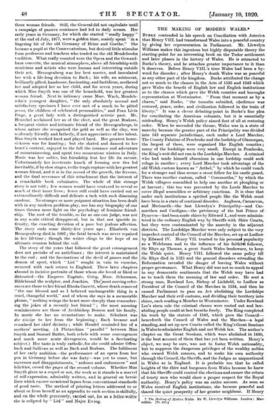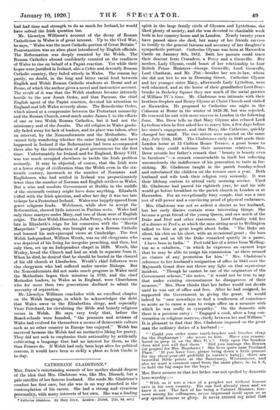THE MAKING OF MODERN WALES* BURKE contended in his speech
on Conciliation with America that Henry VIII. had transformed Wales into a peaceful country by giving her representation in Parliament. Mr. Llewelyn Williams makes this ingenious but highly disputable theory the starting-point for an interesting book on the Tudor settlement and later phases in the history of Wales. He is attracted to Burke's theory, and he attaches greater importance to it than It deserves. Before Henry VIIL's time Wales had been a by- word for disorder ; after Henry's death Wales was as peaceful as any other part of the kingdom. Burke attributed the change not so much to the clauses in the Acts of 1535 and 1543 which gave Wales the benefit of English la* and English institutions as to the clauses which gave the Welsh counties and boroughs representation at Westminster. "From that moment as by a charm," said Burke, "the tumults subsided, obedience was restored, peace, order, and civilization followed in the train of liberty." It was a clever debating-point in Burke's fine plea for conciliating the American colonists, but it is essentially misleading. Henry's Welsh policy aimed first of all at restoring order. When he ascended the throne, Wales was in a state of anarchy because the greater part of the Principality was divided into 143 separate jurisdictions, each under a Lord Marcher. The County Palatine of Pembroke and the lordship of Glamorgan, the largest of these, were organized like English counties ; many of the lordships were very 81118/1. Except in Pembroke, the King's writ did not run in the Lordships Marcher. A criminal who had made himself obnoxious in one lordship could seek refuge in another ; every Lord Marcher took advantage of the old Welsh custom known as " Arthel," by which he could vouch for a stranger and thus secure a stout fellow for his castle guard. There was another custom, called C,ommortha," by which the Welsh villagers assembled to help one another at ploughing or at harvest ; this too was perverted by the Lords Marcher to cover illegal assemblies or arbitrary exactions. It is clear that under such institutions a spirited people like the Welsh mat have been in a state of continual disorder. Anglesea, Carnarvon, and Merioneth—the last Llewelyn's Principality—and Car- marthen and Cardigan—the patrimony of the last Prince of - Dynevor—had been made shires by Edward I., and were adminis- tered in the ordinary English way by Sheriffs with Shire Courts, but they were contaminated by the anarchy in the adjacent districts. The Lordships Marcher were only subject to the very imperfect control of the Council of the Marches, set up at Ludlow by Edward IV. Henry VII. trusted to his personal popularity as a Welshman and to the influence of his faithfrel follower, Sir Rhys ap Thomas, a great South Wales landowner, to keep the Welsh quiet. Henry VIII. followed the same policy till Sir Rhys died in 1525 and the general disorders attending the Reformation revealed the danger of leaving Wales without proper governance. What Henry did was not so much to appeal to any democratic sentiments that the Welsh may have had as to teach them the meaning of law and order. He sent a strong man, Rowland Lee, Bishop of Lichfield, to Ludlow as President of the Council of the Marches in 1534, and then he caused Parliament to pass an Act abolishing the Lordships Marcher and their evil customs, and dividing their territory into shires, each sending a Member to Westminster. Under Rowland Lee's stern rule the criminal classes were rooted out and law- abiding people could at last breathe freely. The King completed his work by the statute of 1543, which gave the Council— henceforth the Council of Wales and the Marches—a legal standing, and set up new Courts called the King's Great Sessions in Wales to administer English and not Welsh law. The author's chapter on the Great Sessions, which were abolished in 1830, is the best account of them that has yet been written. Henry's object, we may be sure, was not to foster Welsh nationality, but to suppress the dangerous privileges of the wealthy nobles who owned Welsh manors, and to make his own authority through the Council, the Sheriffs, and the Judges as unquestioned in Wales as in England. It is probable too that he called knights of the shire and burgesses from Wales because he knew that his Sheriffs could control the elections and ensure the return of trusty men who would show a proper respect for the Royal authority. Henry's policy was an entire success. As soon as Wales received English institutions, she became peaceful and shared the quiet prosperity of her greater neighbour. If Henry • The Making of Modern Wake. By W. Llcivelyn Williams. London : Mac- millan. [Ss. neta
had had time and strength to do as much for Ireland, he would have solved the Irish question too.
Mr. Llewelyn Williams's account of the decay of Roman Catholicism in Wales is of great interest. Up to the Civil War,
he says, "Wales was the most Catholic portion of Great Britain."
Protestantism was an alien plant introduced by English officials. The Reformation was deeply resented by the Welsh. The
Roman Catholics abroad confidently counted on the readiness of Wales to rise on behalf of a Papist reaction. Yet while their hopes were justified in Ireland, also a Celtic and devoutly Roman Catholic country, they failed utterly in Wales. The reason lay partly, no doubt, in the long and bitter racial feud between -English and Welsh Roman Catholic students at Douai and at Rome, of which the author gives a novel and instructive account. The result of it was that the Welsh students became intensely hostile to the new Jesuit Order, and that Parsons, the chief English agent of the Papist reaction, devoted his attention to England and left Wales severely alone. The Benedictine Order, which aimed at a compromise between the Protestant monarchy and the Roman Church, owed much under James I. to the efforts of one or two Welsh Roman Catholics, but it had not the missionary zeal of the Jesuits. The old religion in Wales gradu- ally faded away for lack of leaders, and its place was taken, after an interval, by the Nonconformists and the Methodists. We cannot help wondering whether the same thing might not have happened in Ireland if the Reformation had been accompanied there also by the introduction of good government for the first time. Unfortunately for Ireland and for England, Henry VIII. was too much occupied elsewhere to tackle the Irish problem seriously. It may be objected, of course, that the Irish were at a lower stage of civilization than the Welsh even in the six- teenth century, inasmuch as the number of Normans and Englishmen who had settled in Ireland was proportionately fewer than the number of Norman and English settlers in Wales. But a wise and resolute Government at Dublin in the middle of the sixteenth century might have done anything. Elizabeth trifled with the Irish question, and after her day it was too late to hope for a Protestant Ireland. Wales was happily spared from grave religious feuds. Welshmen, while slow to accept the Reformation, showed little interest in Puritan sects. Wales had only three martyrs under Mary, and two of them were of English origin. The first Welsh Dissenter, John Penry, who was executed late in Elizabeth's reign for his connexion with the "Martin Marprelate " pamphlets, was brought up as a Roman Catholic and learned his anti-episcopal views at Cambridge. The first Welsh Independent, William Wroth, was an old clergyman who was deprived of his living for irregular preaching, and then, but only then, set up an Independent chapel in 1639. Wroth, like Wesley, loved the Church and had no wish to separate from it. When he died, he desired that he should be buried in the chancel of his old church at Llanfaches. Wroth's chief followers were also clergymen who had suffered under unwise Bishops. But the Nonconformists did not make much progress in Wales until the Methodists began their missions in 1735, and the chief Methodist leaders, in Wales as in England, were Churchmen who for more than two generations declined to admit the necessity of separation.
Mr. Llewelyn Williams concludes with an excellent chapter on the Welsh language, in which he acknowledges the debt that Wales owes to the Elizabethan clergy, and especially Vicar Pritchard, for circulating the Bible and homely religious verses in Welsh. He says very truly that, before the Board-schools were founded, "the peasants and artisans of Wales had evolved for themselves a means of democratic culture such as no other country in Europe has enjoyed." Welsh has survived because the Welsh had an instinctive liking for poetry. They did not seek to emphasize their nationality by artificially cultivating a language that had no interest for them, as 'the Sum Feiners do. If Welsh had only been kept alive for political reasons, it would have been as sickly a plant as Irish Gaelic is to-day.



































 Previous page
Previous page